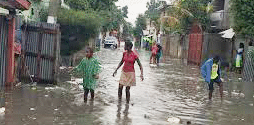 BRIDGETOWN, Barbados — The Barbados-based Caribbean Development Bank (CDB) is supporting the Government of Haiti in reducing poverty, building resilience, and achieving sustained economic growth for all.
BRIDGETOWN, Barbados — The Barbados-based Caribbean Development Bank (CDB) is supporting the Government of Haiti in reducing poverty, building resilience, and achieving sustained economic growth for all.
A new country strategy, approved by CDB’s board of directors on Thursday, proposes a programme of assistance of US$100 million for the period 2017 to 2021 to help Haiti meet its development priorities.
This total includes US$45 million in grant resources.
“The Government of Haiti has set an ambitious development agenda to unlock the country’s growth potential and build a dynamic, resilient and competitive economy. This country strategy, jointly developed with the Government, is designed to deliver strong development impact, particularly in agriculture, education and training, and sustainable energy,” said Dr Justin Ram, director of economics, CDB.
The five-year strategy focuses on three main themes: agriculture and community development, sustainable energy development, and education and training.
Gender equality, regional cooperation and integration, and environmental sustainability considerations will also be mainstreamed across all CDB interventions delivered under the programme of assistance.
CDB consulted with Government officials and stakeholders to ensure the design of the country strategy aligns with the strategic development priorities of Haiti, promotes coordination among development partners and donors, and identifies opportunities for collaboration among them.
The country strategy is aligned with CDB’s strategic objectives of supporting inclusive and sustainable growth and development, and promoting good governance. The strategy was crafted within a results management framework that will be the principal tool used to monitor implementation and the achievement of results.
CDB’s previous country strategy for Haiti was for the period 2013 to 2016.
The resource envelope of US$42 million in grants supported the Education for All Phase II Project; the Technical and Vocational Education and Training Project II; interventions in agriculture and rural development; the payment of Haiti’s premiums for coverage under CCRIF SPC; environmental projects; and technical assistance for micro, small and medium-sized enterprises’ development.


